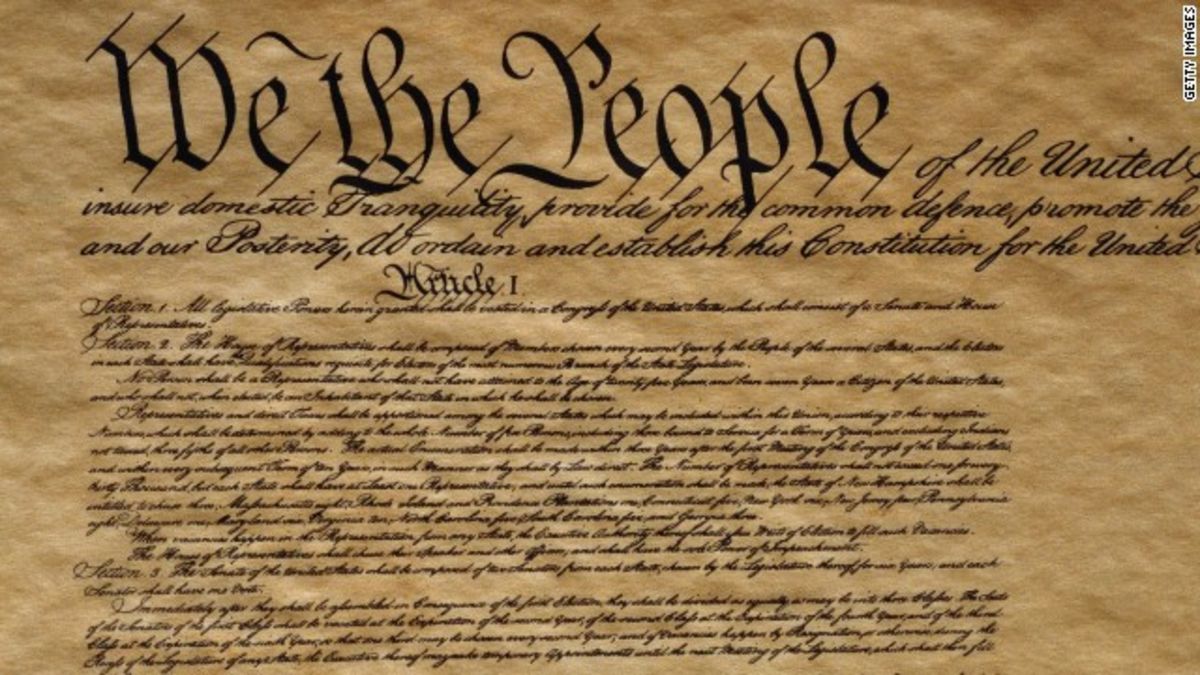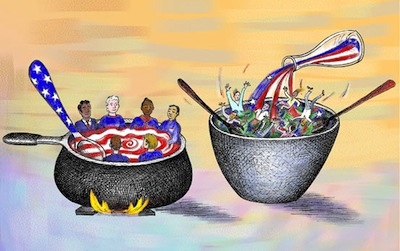Illustration by Barbara KelleyIn How To Be An Antiracist, Ibram Kendi examines three approaches for dealing with race in America: Assimilation, Segregation, and Antiracism.
It's fair to say that segregation as a theory has lost. In its place, it evolved into some combination of desegregation, antiracism, and integration into a new term that, when you get down to it, is not all that different from segregation: multiculturalism. It's segregation without the coercion. (I'm describing theories here, not practice. In practice, housing discrimination and zoning have resegregated communities, not multiculturalism.)
In the essay "Unbecoming American", Johann N. Neem writes beautifully about being an Indian immigrant, what it means to be an American, and how that meaning is fading.
"Last year, when I ran into my son’s coach at the mall, he stumbled awkwardly after asking me if I was Christmas shopping, as if he’d committed an offense against my brown skin. In fact, I was Christmas shopping and I was as miserable as he seemed to be about finding myself at the mall. Why would he think I would feel more welcome by being excluded from American traditions? There is a big difference between asking non-Christians to pray and inviting them, as fellow Americans, to sing carols, eat cookies, and share good cheer. The inability of well-meaning progressives to understand that difference may result in an America with many small tents next to a larger but less inclusive one."
It's a long and wonderful essay, but this paragraph nicely describes his three different versions of America.
- Assimilation: asking non-Christians to pray.
- Multiculturalism: many small tents next to a larger but less inclusive one.
He also describes a third way, which I will get to, that includes an invitation to "sing carols, eat cookies, and share good cheer."
Spaces
Kendi also wrote about the concept of black spaces. Professor Roderick Graham explains the idea here, quantifying it by measuring levels of anxiety among African-Americans in spaces where they are the minority (non-HBCU colleges, white-collar offices, etc.). This is why we now have "safe spaces."
In the political landscape, the idea of spaces is kind of like the libertarian idea of federalism or localism; instead of a strong central government, you divert power to the many individual state and local governments.
In order to unite the 13 original colonies, the founders had to agree to respect some level of sovereignty. States needed to be safe spaces, but in order to unite, they needed something similar to assimilation. Or, as Stephen Pinker explains in Enlightenment Now, an appeal to Humanism.
“History confirms that when diverse cultures have to find common ground, they converge toward humanism. The separation of church and state in the American constitution arose not just from the philosophy of the enlightenment but from practical necessity. The economist Samuel Hammond has noted that 8 of the 13 British colonies had official churches, which intruded into the public sphere by paying ministries salaries, enforcing strict religious observance, and persecuting members of other denominations. The only way to unite the colonies under a single constitution was to guarantee religious expression and practice as a natural right."
The states didn't agree on a single religion, but they agreed on the right to practice and not intrude on other states' religions.
Universal Programs or Universal Culture
I think the crux of many contemporary American problems is that we still haven't decided if we are a multicultural or an assimilationist society. Are we going to have our own spaces or are we going to expect shared spaces? The answer is important because this decision will affect policy.
Multiculturalists tend to be progressives, and progressives tend to want strong national programs like Medicare for All, Universal Pre-K, and free college, in addition to more support for current national programs like social security and public education.
Progressives have not made much progress on these issues. My theory is that on things like healthcare, there are too many cultural values baked into it. How are we ever going to get a country to decide on a national healthcare plan that includes things like abortion, birth control, gender transitional surgery, hormone therapy, or conversion therapy?
It's the same reason why is Tom Cotton trying to ban the 1619 Project from being taught in public schools? Because everyone is trying to insert their own space into a national program that is supposed to serve everyone.
Multiculturalists 🤝 Libertarians
One solution is for space-loving multiculturalists to create a natural coalition with space-loving libertarians: abandon national programs and use states and localities as spaces to create their own unique cultures.
I saw a progressive friend retweet a tweetstorm from Martellus Bennet about the education system. I wonder how many libertarians nodded along as they read this tweet, using the same argument they use for the dissolution of the Department of Education.
The uniformity of national programs necessarily rejects multiculturalism.
Other countries can get away with universal healthcare because there is a dominant culture and civic pride. In “This Is How Scandinavia Got Great” David Brooks writes:
“They look at education differently than we do. The German word they used to describe their approach, bildung, doesn’t even have an English equivalent. It means the complete moral, emotional, intellectual and civic transformation of the person...
Bildung is devised to change the way students see the world. It is devised to help them understand complex systems and see the relations between things — between self and society, between a community of relationships in a family and a town...
Bildung is the way that the individual matures and takes upon him or herself ever bigger personal responsibility towards family, friends, fellow citizens, society, humanity, our globe, and the global heritage of our species, while enjoying ever bigger personal, moral and existential freedoms."
If you want space, you cannot have national programs. If you want national programs, you'll need something like Humanism, and a dash of assimilation.
Infinite Reversals
Noah Smith wrote a column arguing for expanding Medicare. He tweeted about hating market-based solutions to healthcare.
I decided to ask Noah what he thought of Switzerland's model, which uses only private insurers and has 100 percent coverage. This was his response:
I worry that this is the trend for all newly proposed federal programs; they are all vulnerable to political reversals.
Inclusive American Culture
Kendi might argue that assimilation is just whiteness, just giving into Tom Cotton's world view. I would argue that a better version of assimilation is more like Humanism: we should be many small tents under one big tent.
We shouldn't push our religious or ideological views on others, but we should view things like singing Christmas carols and decorating a town tree as more American than religious, an invitation to celebrate the human spirit in a uniquely American way.
An example of good cultural appropriation is the Holyoke St. Patrick's Day weekend. Holyoke, Mass. was known as the Paper City for all the downtown paper mills that sprung up during the industrial revolution. The city attracted many Irish immigrants, setting the stage for what has become the second-largest St. Patrick's Day parade in the country, in a city of roughly 40,000 people.
Today, more than half of the residents are Hispanic, and yet St. Patrick's Day weekend is livelier than it has ever been. Show up and you'll see Puerto Rican children with green shamrocks painted on their faces. You can grab a Guinness at an Irish-themed bar, walk across the street and order Dos Equis at the Latin American Motorcycle Association. The phrase "Everyone is Irish on St. Patrick's Day" has never felt more real because the event celebrates the community and welcomes everyone.
Like the Holyoke St. Patrick's Day Weekend, there has to be a national common human experience that holds us together. Something more unifying than libertarian and multicultural spaces. Something more inclusive than monoculture. Something less coercive than a national program infused with one tribe's values.
If both tribes can agree on a simple question, we can solve this problem.
The question? What does it mean to be an American?

